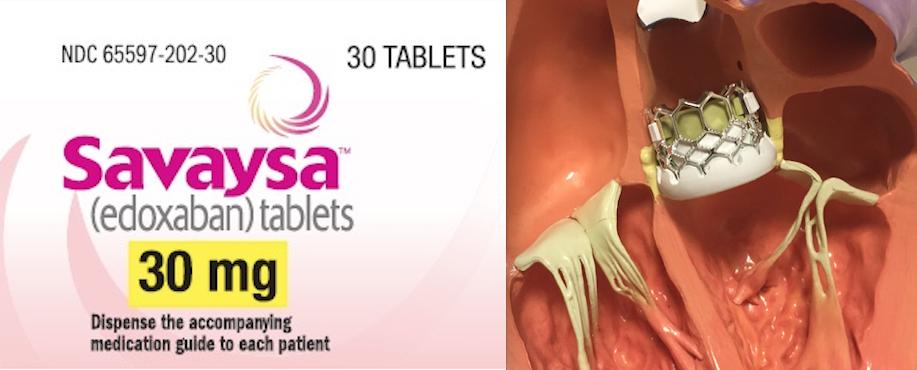
The anticoagulant edoxaban (Savaysa) may be just as effective as warfarin for preventing heart attack or stroke in patients with AFib who undergo transcatheter aortic valve replacement (TAVR), according to an ESC late-breaking trial.
September 1, 2021 – The anticoagulant edoxaban (Savaysa) may be just as effective as warfarin for preventing heart attack or stroke in patients with atrial fibrillation (AF) who undergo transcatheter aortic valve replacement (TAVR), according to a large-scale international study led by Mount Sinai.
The ENVISAGE-TAVI AF trial is the largest to investigate an edoxaban-based strategy in this patient population compared with warfarin, which is currently the standard of care. It demonstrates that edoxaban is non-inferior to warfarin.
The results, which could lead to an alternative treatment strategy, were announced Saturday, August 28, as a late-breaking clinical trial at the European Society of Cardiology (ESC) Congress 2021 and simultaneously published in The New England Journal of Medicine.[1]
“Atrial fibrillation after transcatheter aortic valve replacement is common, especially among older patients, but there has been little research on the optimal treatment strategies, and this has resulted in heterogeneous use of anticoagulants in clinical practice. TAVR patients are typically very elderly and possess numerous comorbidities; therefore they are at high risk for all sorts of adverse events, both ischemic and bleeding. It is important to further understand what treatment is most effective to prevent devastating complications,” said lead investigator George Dangas, M.D., Ph.D., professor of medicine (cardiology) and director of cardiovascular innovation at the Zena and Michael A. Wiener Cardiovascular Institute at the Icahn School of Medicine at Mount Sinai.
“Based on these results, the trial met its primary endpoint of non-inferiority and edoxaban may be a plausible alternative to warfarin, albeit with attention to increased bleeding with this agent in this study population,” he explained.
Anticoagulation in TAVR
Cardiologists prescribe antithrombotic agents — specifically warfarin, a vitamin K antagonist — to prevent thromboembolic complications in patients who have TAVR, a minimally invasive heart procedure to replace the aortic valve. Choosing the optimal antithrombotic regimen remains challenging, especially in patients with an underlying condition like AF—irregular rapid heartbeat that impacts blood flow—that requires the use of anticoagulants. Past studies have shown anywhere between 20-40 percent of TAVR patients have AF and a large proportion of them are frail, so a main challenge in managing their care involves balancing the risks of bleeding and stroke.
Until now, there has been minimal research into the optimal oral anticoagulation therapy in TAVR patients.
ENVISAGE-TAVI AF Trial Details
Mount Sinai researchers led an international trial across 173 centers in 14 countries to compare the safety and efficacy of edoxaban versus warfarin in AF patients who need oral anticoagulation. To determine efficacy, they looked at combined adverse clinical events including all-cause death, thromboembolic events, and major bleeding. For safety they looked at serious bleeding events. Investigators randomized 1,426 patients 5 to 12 days after TAVR to either warfarin (with or without antiplatelet therapy) or 60 mg daily oral edoxaban (with or without antiplatelet therapy). They followed up with patients for up to three years following TAVR (average of 18 months). The study findings showed that edoxaban was noninferior to warfarin for efficacy as assessed by a composite set of ischemic and bleeding adverse events. At the same time, edoxaban led to some higher bleeding complications (mainly gastrointestinal) when compared to warfarin (or its analogs as available in each country).
Interestingly, patients who received a lower dose of edoxaban (30 mg instead of 60 mg) due to poor kidney function or low body weight appeared to have similar rates of adverse thromboembolic and bleeding events to those on warfarin.
“The next step would be to establish in large randomized trials the optimal anticoagulant dose according to different bleeding-ischemic risk profiles,” added Dangas. “It seems that lowering the edoxaban dosage when indicated and avoiding patients with mandatory antiplatelet therapy because of their elevated bleeding risk is reasonable safety advice from the clinical point of view. We will be conducting a detailed analysis on various types of bleeding in the near future. ENVISAGE-TAVI AF suggests that treatment with edoxaban can be valuable in the management of this high-risk population of AF patients after TAVI.” ENVISAGE-TAVI AF was sponsored by Daiichi Sankyo Inc. with a scientific collaboration between scientists of Icahn Mount Sinai and Global Specialty Medical Affairs of Daiichi Sankyo.
For more information: www.mountsinai.org
Reference:


 August 28, 2023
August 28, 2023 









